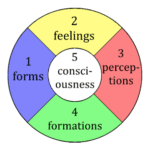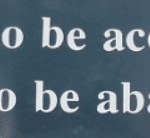The spiritual dangers of meditation are mostly non-serious, but under rare conditions, such as intensive meditation or ongoing psychological difficulties, meditation can create potent adverse conditions. Return of painful memories, depression, anxiety, Dark Night of the Soul and even psychosis.
Table of Contents

Meditation is far more powerful than most people realize. It can strike deep into the mind if practiced intensively. It IS possible to alter fundamental belief structures and to dismantle even the strongest of emotional fixations. Deeply buried issues can arise, unseen tendencies can be triggered, and incorrect views be installed. These can be extremely challenging on a psychological, emotional, and spiritual level.
Is Meditation Harmful?
Meditation is not harmful per se. However, certain negative consequences, at least temporarily, can emerge from meditation. Most of these are buried in the psyche already and meditation only reveals them. Others occur as relative harms, such as not wanting to be around people after intense periods of meditation. These tend to soften rather soon, however.
Meditation can unearth deep-seated anxieties, but it is also one of the strongest tools for overcoming anxiety.
The Dark Night of the Soul

The term “The Dark Night of the Soul” was coined by the 16th-century Spanish mystic and poet, St. John of the Cross. This concept refers to a profound spiritual crisis characterized by a sense of spiritual desolation, inner turmoil, and a feeling of being distant from the divine.
During this experience, individuals often grapple with doubt, uncertainty, and a sense of abandonment by the divine presence. It is a period of intense inner purification and spiritual growth, although it can be deeply unsettling.
The Dark Night of the Soul is seen as a critical phase in one’s spiritual journey, where the ego and attachments are gradually stripped away, allowing the individual to transcend their limited sense of self and achieve a deeper connection with the divine. While it can be a painful and challenging process, it is believed to be a necessary step towards achieving a more profound spiritual awakening and a closer union with the divine. Many mystics and spiritual seekers throughout history have described their own encounters with the Dark Night, emphasizing its transformative power and its potential to lead to a more profound and authentic spiritual experience.
Grasping at Nyams
Nyams are temporary experiences in meditation. There are, in a sense, many of them. However, the primary ones in Tibetan Buddhist thought are Clarity, Bliss, and Nonthought. Nyams, in themselves, are not a problem. However, they feel so different, good, and profound that people mistake them for enlightenment and grasp onto them.
It is a good idea to prepare beforehand for major experiences on a meditative journey. Such things are quite real in terms of one’s experience. Without good foreknowledge and proper view, nyams can be extremely destabilizing. With those things, they can provide impetus to the path. See this for a detailed look into nyams.
Kundalini Shock
Kundalini awakening, a concept rooted in ancient Indian spiritual practices, is often depicted as a powerful and transformative experience, but it comes with potential dangers that should not be underestimated. When the dormant Kundalini energy, often visualized as a coiled serpent, is unleashed through various yogic and meditative techniques, it can lead to an overwhelming surge of energy throughout the body and mind. This uncontrolled release can cause a range of physical, emotional, and psychological symptoms, including intense sensations, emotional instability, and even hallucinations. In some cases, individuals may experience a loss of grounding and disconnection from everyday reality, leading to psychological distress and disorientation.
Furthermore, Kundalini awakening can be accompanied by a phenomenon known as “Kundalini syndrome,” which can manifest as distressing physical symptoms, such as muscle spasms, involuntary movements, and even chronic pain. The unprepared practitioner may struggle to integrate these experiences into their daily life, leading to disruptions in their physical and mental well-being.
Additionally, without proper guidance and a strong spiritual foundation, individuals undergoing Kundalini awakening may face the risk of developing delusions of grandeur or spiritual superiority, which can negatively impact their relationships and overall mental health. Therefore, while Kundalini awakening holds the promise of spiritual enlightenment and growth, it is essential to approach it with caution and under the guidance of experienced mentors to mitigate the potential dangers associated with this profound transformation.
Meaninglessness or Despair from Meditation
Meditation on emptiness or not-self can lead to meaninglessness or despair. This is because the view is not properly held. Making not-self or emptiness the primary project of meditation skirts the edge of a nihilistic outlook. Often in the West, we hold a version of this already because so few truly believe in any God. Nihilism here means meaningless.
Meditation should lead to joy. Realization of not-self is liberating, not depressing. I have met many highly accomplished practitioners and they are not depressed, nor do they live in a meaningless state. Rather they express great happiness, friendliness, and a subdued joie de vivre that is difficult to pinpoint.
Black Emptiness from Meditation
Black shunyata or emptiness is a common condition in Buddhist philosophy. It comes from meditation on Shunyata too vigorously, essentially mistaking meditation experiences of non-thought for emptiness. The precise condition is believing that emptiness itself is a ‘thing’, a sort of substance that manifests relative reality. This is a false understanding, as is taught.
When this wrong view is meditated on intensively, the practitioner can develop, can create a new reality based on that. They then see the world as arising out of this dark or black emptiness. It’s a somewhat horrific and frightening outcome or reality. The experience can be countered. It can be turned around, but it does affect a number of people. This is why it’s important to have meditation under the guidance of a highly skilled teacher who understands meditation well. When this wrong view is meditated on intensively, the practitioner
When should you not meditate?
You should probably not meditate under the following conditions
- Mind is intensely overactive. This does not mean normally strong activity, but very powerful emotional content. Meditation, unless you are well trained, will likely be unproductive and too difficult. A physical activity using a meditative frame of mind will be more useful.
- During or after a psychotic break. Meditation can enhance the psychosis.
- You should not meditate at night, according to some because it can make it difficult to sleep.
Spiritual Dangers of Meditation in Christianity
Is meditation against Christianity? No, meditation isn’t against the Christian doctrine. The Christian debate is mixed, but the against side tends to be overly reactive and poorly referenced. The biblical citations are pretty stretched. According to this creed, meditation is a big no-no in Christianity. They claim the Bible forbids it. Here are the reasons:
- It ain’t Christian. Coming from the East, the words of Moses can be twisted to mean “Don’t meditate.”
- Mind-emptying is not Biblical, but you should fill the mind with the word of God.
- Based on a false idea of Eastern meditation, which means emptiness of concept, and direct perception of reality.
- Allows for demonic possession. Mind-emptying apparently clears the way for demons to take over.
- A bit laughable, and again relies on tortured logic.
- Concentration is on the self, not on God.
- Misunderstanding of meditation, which is typically focused on not-self.
Contrast that with this Christian, who lauds meditation as a totally Christian virtue! Donna sought advice from Catholic Priest Thomas Merton’s followers. The following were useful.
- Psalm 46:10, ‘Be still and know I am God.’
- The Holy Spirit fills us as we empty ourselves of ‘the false self.’
- I quiet myself and want to be with God, Spirit never hides from me and there just isn’t room in that encounter for anything not of God.
- If the void is filled with the presence and spirit of God, how could the devil even attempt to get in?
- Try to fill your soul with Christ so that it’s not empty.
And so on. The upshot seems to be that a quiet mind allows you to hear God. In other words, the dangers of the first list are not really encountered. No one is actually possessed by demons in meditation.
How to meditate like a yogi
and enter profound samadhi
Triggering of negative Ideation
Most of us have negative thoughts. When we meditate, we look at the mind more closely. Those negative thoughts can appear worse than they are. They become magnified and the mind tends to recreate and reinforce them. This is simply because there is nothing else to distract the mind. Some people think this is a problem and become concerned. They often stop meditating, believing that meditation is causing the negative patterns.
Meditation does not cause negative thinking. It only reveals it. The person MUST have such a tendency already. Meditation, by slowing down, merely highlights these thoughts. Though painful, it is actually a blessing. Now one can see the thoughts and begin to work them. Let them go. Develop that as a practice. That is actually a key instruction. Non-fixation on thought.
Conceptual and Experiential Harm
Professor Willoughby Britton conducted a study. She found that in some circumstances people went through terrible experiences meditating. A distorted perception of emptiness caused one man to feel himself ‘permanently damaged.’ Another felt he had an ‘irrevisible’ experience of shunyata.
These situations are rare, but not so rare as one might think. It is good to know your own mind well and ease into intensive practices.

Flow, the profound mental state, also called Peak Performance, can be attained with meditation and can be ‘triggered’ at will, with enough discipline. Guide to Flow Mastery will teach you how.
Antisocial Affectation Caused by Meditation
In this detailed study, people had antisocial changes in behavior caused by longterm meditation. These were not active, but rather feelings of not wanting to be around people. Some people had difficulties reintegrating. Others reported challenges in returning to work. Demotivation also was cited as an issue.
Hallucinations and Cognitive Functioning Problems from Meditation
The same study found some intense mental outcomes:
The principal impairments in the cognitive domain were problems with executive functioning (inability to concentrate for extended periods, or problems with memory) and the disintegration of conceptual meaning structures, where percepts and concepts became disconnected. Increased cognitive processing speed, colloquially described as “mind racing,” also tended to be reported as unpleasant, and vivid imagery was given positive or negative valence depending on the content or intensity.
The category that the research team had the greatest difficulty operationalizing was delusional, irrational, or paranormal beliefs, in part because a particular belief could be appraised in multiple ways depending on the practitioner and his or her social context.
The varieties of contemplative experience: A mixed-methods study of meditation-related challenges in Western Buddhists
Jared R. Lindahl, et al.
Hypersensitivity and Perceptual Distortions from Meditation
Many people developed sensory hypersensitivity in the same study. Light, sounds, feelings, and smells all aroused an intense reaction in some people. This was temporary. Others found the visual field to have intense lights, or total dissolution of visual perception. Sometimes the body felt to be a different shape or size.
How to Meditate Safely
To meditate safely, find a mentor who is experienced in mediation. Try to find someone who has experienced their own challenges and come out okay.
Take it slow and watch for emergent instabilities in the mind. Keep this list bookmarked and refer to it before a period of lengthy meditation. If things get very challenging, go for long walks. If all else fails, contact me. I have been through it several times. I can definitely help.



faq
Is meditation a Sin?
Meditation is not a sin, according to the Bible. Be still and know God, for example, is one injuction.
Are there any negative effects of meditation?
There can be. Some people have psychotic breaks from meditation. Obviously, the tendency must be there prior to the practice. Such reports almost always come from intense retreats, not daily practice.
What could go wrong in meditation?
Things that can go wrong in meditation are increased stress and depression. 8% of people had some problems from meditation in this metastudy. Problems were not severe, however. Another study found no negative outcomes.
What does God say about meditation?
According to the Bible, God says to meditate on the word of God.
Who should not meditate?
Potentially, you should not meditate intensely if you have genuine PTSD from war. It could retrigger the memories. On the other hand, some people with PTSD have experienced dramatic recovery from the condition through meditation.
Conclusion
Meditation, while offering a wealth of physical, mental, and spiritual benefits, is not without its potential spiritual and psychological dangers. It is crucial for individuals to approach meditation with a sense of mindfulness and responsibility.
Without proper guidance and self-awareness, meditation can lead to issues like depersonalization, and emotional instability, and even exacerbate pre-existing psychological conditions. Furthermore, the pursuit of altered states of consciousness through meditation, if not undertaken with care, can give rise to spiritual delusions and disconnection from reality.
However, these potential dangers should not deter individuals from the practice of meditation. Instead, they should serve as a reminder of the importance of balanced and informed approaches to meditation. Meditation is very powerful.
Seeking guidance from experienced teachers and healthcare professionals, maintaining a healthy skepticism, and cultivating self-awareness can help mitigate these risks, allowing individuals to harness the truly transformative potential of meditation while safeguarding their mental and spiritual well-being. In the end, when approached with caution and a deep understanding of its complexities, meditation can be a powerful tool for self-discovery, personal growth, and spiritual awakening.

May all beings be happy
May all beings be peaceful
May all beings be safe
May all beings awaken to the light of their true nature
May all beings be free

May all beings be happy
May all beings be peaceful
May all beings be safe
May all beings awaken to the light of their true nature
May all beings be free







